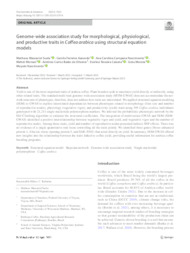Genome-wide association study for morphological, physiological, and productive traits in Coffea arabica using structural equation models.
Genome-wide association study for morphological, physiological, and productive traits in Coffea arabica using structural equation models.
Author(s): SUELA, M. M.; AZEVEDO, C. F.; NASCIMENTO, A. C. C.; MOMEN, M.; OLIVEIRA, A. C. B. de; CAIXETA, E. T.; MOROTA, G.; NASCIMENTO, M.
Summary: Yield is one of the most important traits of arabica coffee. Plant breeders seek to maximize yield directly or indirectly, using other related traits. The standard multi-trait genome-wide association study (MTM-GWAS) does not accommodate the network structure of phenotypes, therefore, does not address how traits are interrelated. We applied structural equation modeling (SEM) to GWAS to explore interrelated dependencies between phenotypes related to morphology (fruit size and number of reproductive nodes), physiology (vegetative vigor), and productivity (yield) traits using 195 Coffea arábica individuals genotyped with 21,211 single-nucleotide polymorphism markers. We inferred the probabilistic phenotypic network by the Hill-Climbing algorithm to estimate the structural coefficients. The integration of multivariate GWAS and SEM (SEM-GWAS) identified a positive interrelationship between vegetative vigor and yield, and vegetative vigor and the number of reproductive nodes. Among those traits, yield and number of reproductive nodes presented indirect SNP effects. There was no evidence of a single quantitative trait locus controlling all the traits jointly. We identified three genes (Stress enhanced protein 1, Abscisic stress-ripening protein 5, and SAR?SNI1) that acted directly on yield. In summary, SEM-GWAS offered new insights into the relationship between the traits linked to coffee yield, providing useful information for arabica coffee breeding programs.
Publication year: 2023
Types of publication: Journal article
Unit: Embrapa Coffee
Observation
Some of Embrapa's publications are published as ePub files. To read them, use or download one of the following free software options to your computer or mobile device. Android: Google Play Books; IOS: iBooks; Windows and Linux: Calibre.
Access other publications
Access the Agricultural Research Database (BDPA) to consult Embrapa's full library collection and records.
Visit Embrapa Bookstore to purchase books and other publications sold by Embrapa.

